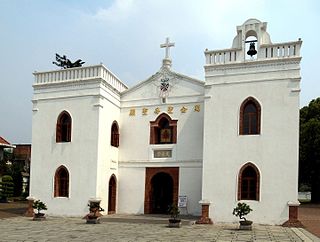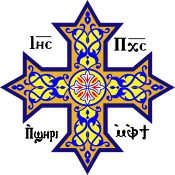
An episcopal polity is a hierarchical form of church governance in which the chief local authorities are called bishops. The word "bishop" here is derived via the British Latin and Vulgar Latin term *ebiscopus/*biscopus, from the Ancient Greek ἐπίσκοπος epískopos meaning "overseer". It is the structure used by many of the major Christian Churches and denominations, such as the Catholic, Eastern Orthodox, Oriental Orthodox, Church of the East, Anabaptist, Lutheran, and Anglican churches or denominations, and other churches founded independently from these lineages. Many Methodist denominations have a form of episcopal polity known as connexionalism.
A Christian denomination is a distinct religious body within Christianity that comprises all church congregations of the same kind, identifiable by traits such as a name, particular history, organization, leadership, theological doctrine, worship style and, sometimes, a founder. It is a secular and neutral term, generally used to denote any established Christian church. Unlike a cult or sect, a denomination is usually seen as part of the Christian religious mainstream. Most Christian denominations refer to themselves as churches, whereas some newer ones tend to interchangeably use the terms churches, assemblies, fellowships, etc. Divisions between one group and another are defined by authority and doctrine; issues such as the nature of Jesus, the authority of apostolic succession, biblical hermeneutics, theology, ecclesiology, eschatology, and papal primacy may separate one denomination from another. Groups of denominations—often sharing broadly similar beliefs, practices, and historical ties—are sometimes known as "branches of Christianity". These branches differ in many ways, especially through differences in practices and belief.
P'ent'ay is an originally Amharic–Tigrinya language term for Pentecostal Christians. Today, the term refers to all Evangelical Protestant denominations and organisations in Ethiopian and Eritrean societies. Alternative terms include Ethiopian–Eritrean Evangelicalism or the Ethiopian–Eritrean Evangelical Church. Sometimes the denominations and organizations are known as Wenigēlawī.

The Evangelical Church of Egypt (Synod of the Nile) (also called the Evangelical Presbyterian Church in Egypt, Egyptian: الكنيسة الإنجيلية المشيخية El-Kenisa El-Engileyya El-Mashyykhia) is a Protestant church that started as a mission of the United Presbyterian Church of North America among Coptic Egyptians in the late nineteenth century. The Evangelical Church of Egypt became autonomous in 1957 and officially independent in 1958. It has eight presbyteries, 314 congregations, and about 250,000 members.

Christianity in Africa arrived in Africa in the 1st century AD, and in the 21st century the majority of Africans are Christians. Several African Christians influenced the early development of Christianity and shaped its doctrines, including Tertullian, Perpetua, Felicity, Clement of Alexandria, Origen of Alexandria, Cyprian, Athanasius and Augustine of Hippo. In the 4th century, the Aksumite empire in modern-day Ethiopia and Eritrea became one of the first regions in the world to adopt Christianity as its official religion, followed by the Nubian kingdoms of Nobatia, Makuria and Alodia and several Christian Berber kingdoms.

Christianity in Sudan has a long and rich history, dating back to the early centuries of the Christian era. Ancient Nubia was reached by Coptic Christianity by the 1st century. The Coptic Church was later influenced by Greek Christianity, particularly during the Byzantine era. From the 7th century, the Christian Nubian kingdoms were threatened by the Islamic expansion, but the southernmost of these kingdoms, Alodia, survived until 1504.

The term Eastern Protestant Christianity encompasses a range of heterogeneous Protestant Christian denominations that developed outside of the Western world, from the latter half of the nineteenth century, and retain certain elements of Eastern Christianity. Some of these denominations came into existence when active Protestant churches adopted reformational variants of Eastern and Oriental Orthodox liturgy and worship, while others originated from Orthodox groups who were inspired by the teachings of Western Protestant missionaries and adopted Protestant beliefs and practices.

Protestantism in Brazil began in the 19th century and grew in the 20th century. The 2010 Census reported that 22.2% of the Brazilian population was Protestant, while in 2020 the percentage was estimated to have risen to 31% of the population, over 65 million individuals, making it the second largest Protestant population in the Western world.
Protestants in India are a minority and a sub-section of Christians in India and also to a certain extent the Christians in Pakistan before the Partition of India, that adhere to some or all of the doctrines of Protestantism. Protestants in India are a small minority in a predominantly Hindu majority country, but form majorities in the north-eastern states of Meghalaya, Mizoram and Nagaland and significant minorities in Konkan division, Bengal, Kerala and Tamil Nadu, with various communities in east coast and northern states. Protestants today trace their heritage back to the Protestant reformation of the 16th century. There are an estimated 20 million Protestants and 16 million Pentecostals in India.

Christianity is the second largest religion in Egypt. The vast majority of Egyptian Christians are Copts. As of 2019, Copts in Egypt make up approximately 10 percent of the nation's population, with an estimated population of 9.5 million or 10 million. In 2018, approximately 90% of Egyptian Christians were Coptic Orthodox.

Christianity is a minority religion in Libya. It has been present in Tripolitania and Cyrenaica since Roman times.
Protestants are about 2,009,374 in Sudan. They are forbidden to proselytize. The law makes apostasy punishable by death. The southern ethnic groups fighting the civil war largely are followers of traditional indigenous religions or Christians.
Protestants make up less than 1% of the population of Libya.
Qatar has a population of approximately 3 million people. About 13.7% are Christian. This includes a large number of migrant workers who follow Catholic, Orthodox or Protestant beliefs. In 2000, the number of Protestants was estimated at 1% of the population and the Anglicans (being classified otherwise there) at 1.4% for the same year.

Christianity is the largest religion practiced in Zimbabwe, accounted for more than 84% of the population. The arrival of Christianity dates back to the 16th century by Portuguese missionaries such as Fr. Gonsalo Da Silveira of the Roman Catholic Church. Christianity is embraced by the majority of the population. It is estimated 85 percent of Zimbabweans claim to be Christians, with approximately 62 percent regularly attending church services. Christian faith plays a very important role in the organization of Zimbabwean society.
Articles related to Christianity include:

Christianity in Taiwan constituted 3.9% of the population, according to the census of 2005; Christians on the island included approximately 600,000 Protestants, 300,000 Catholics and a small number of members of the Church of Jesus Christ of Latter-day Saints.











